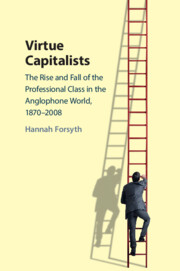Book contents
- Virtue Capitalists
- Virtue Capitalists
- Copyright page
- Dedication
- Contents
- Figures
- Acknowledgements
- 1 Introduction
- Part I Professionalizing the Anglo Economy, c.1870–1945
- Part II Managing the Global Economy, c.1945–1975
- Part III The New Class Conflict, c.1975–2008
- 7 Moral Crisis
- 8 Success Is the Only Virtue
- Epilogue
- Bibliography
- Index
8 - Success Is the Only Virtue
from Part III - The New Class Conflict, c.1975–2008
Published online by Cambridge University Press: 07 September 2023
- Virtue Capitalists
- Virtue Capitalists
- Copyright page
- Dedication
- Contents
- Figures
- Acknowledgements
- 1 Introduction
- Part I Professionalizing the Anglo Economy, c.1870–1945
- Part II Managing the Global Economy, c.1945–1975
- Part III The New Class Conflict, c.1975–2008
- 7 Moral Crisis
- 8 Success Is the Only Virtue
- Epilogue
- Bibliography
- Index
Summary
From the 1980s, globalization produced conditions that demanded tough decisions in a complex set of fluctuating economic circumstances. This required more decision-makers, who discarded almost all virtue but success. Chapter 8 shows that to this new managerial elite, the moral character of the professionals was at best an old-fashioned affectation, at worst the sanctimonious preaching of the old establishment, bleating over their loss of prestige. Managers began to treat those merely applying their expertise as plug-and-play professionals, able to be manoeuvred in and out of place according to flexible strategies. These were applied under a new cliché: ‘work smarter, not harder’, where the ‘smarter’ referred mainly to managerial innovation. Under this managerial regime, success was the only virtue that mattered, while traditional aspects of professional virtue, still needed for professional work to succeed, were embedded into systems for quality and risk management, launching a process of moral deskilling. In this context, professionals turned to a more generic ‘effectiveness’ into which they could pour their personal professional values. This kept them investing relentlessly in their own human capital, reducing the kind of virtue that sought a better world into a category of virtuous consumption.
Keywords
- Type
- Chapter
- Information
- Virtue CapitalistsThe Rise and Fall of the Professional Class in the Anglophone World, 1870–2008, pp. 232 - 253Publisher: Cambridge University PressPrint publication year: 2023

